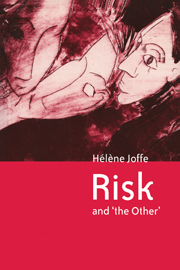Book contents
- Frontmatter
- Contents
- Preface
- Acknowledgements
- 1 Responses to risks: an introduction
- 2 Human responses to risks: ‘not me’, ‘the other is to blame’
- 3 A study of lay people's responses to a risk: HIV/AIDS in Britain and South Africa
- 4 Evaluating two social psychological models of the response to risks
- 5 The source of linking risk and ‘the other’: splitting objects into ‘good’ and ‘bad’
- 6 Social representations of risks
- 7 Emotional life: a new frontier for social theory
- 8 Changing social representations of risks
- References
- Index
3 - A study of lay people's responses to a risk: HIV/AIDS in Britain and South Africa
Published online by Cambridge University Press: 22 September 2009
- Frontmatter
- Contents
- Preface
- Acknowledgements
- 1 Responses to risks: an introduction
- 2 Human responses to risks: ‘not me’, ‘the other is to blame’
- 3 A study of lay people's responses to a risk: HIV/AIDS in Britain and South Africa
- 4 Evaluating two social psychological models of the response to risks
- 5 The source of linking risk and ‘the other’: splitting objects into ‘good’ and ‘bad’
- 6 Social representations of risks
- 7 Emotional life: a new frontier for social theory
- 8 Changing social representations of risks
- References
- Index
Summary
To shed light on the complex structure of risk-related thought, in this chapter I examine responses to one mass crisis at a particular point in time. I focus on representations of AIDS in the first decade of its advent. I examine the themes that dominate interview talk on the origin, spread and risk of AIDS in Britain and South Africa. Out-groups and in-groups are sampled in both cultures, and I reflect upon the commonality and differences in their representations. The analysis of interview data is set against a backdrop of a thematic analysis of the concurrent medical scientific and mass-mediated ideas. I interweave the findings with the vast literature on early responses to AIDS.
Responses to AIDS in the early years – a depth study of two cultures
Early lay and medical scientific responses to the potential AIDS pandemic provide a fascinating illustration of the link made between mass risk and ‘the other’. The lay representations presented in this chapter were gleaned by way of semi-structured interviews with sixty Britons and South Africans. The sample was chosen in accordance with a matched set of criteria to ensure comparability across cultures and groups. A basic criterion for selection was that respondents were urban, young adults with a high level of education. Half of the respondents were British and half South African. They were drawn from three major urban centres in the two countries: London, Johannesburg and Soweto.
- Type
- Chapter
- Information
- Risk and 'The Other' , pp. 37 - 55Publisher: Cambridge University PressPrint publication year: 1999



